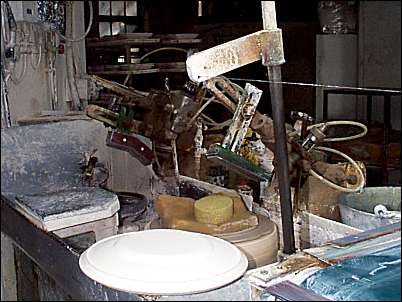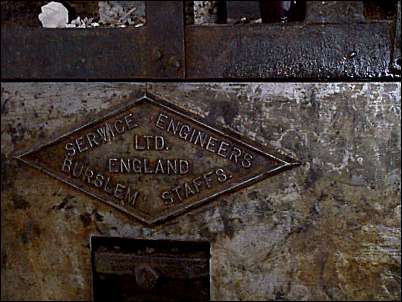Photo
of the Week
Potworks of the Week
Service (Engineers) Ltd,
Burslem

Service (Engineers) Ltd, Burslem
from: Prestige and Progress - A Survey of
Industrial North Staffordshire
1955 publication of North Staffordshire Chamber of Commerce
|
Steam powered
jiggers (and jolleys - for producing hollow ware) were known of in
the 1840s but there was much worker resistance to their
introduction. The first mechanical jigger replacing hand power was
the Porteus, driven by long lengths of shafting and belts. The
potters were charged a weekly rent equivalent to the wages they
had paid the boy who powered it before. In 1863 Francis Wedgwood
had a plate making machine presented by a continental potter. The
machine was so popular that within 15 years most of the large
companies used it.
To work to capacity
the jiggerer needed three boy attendants, and 600-1000 moulds.
One attendant cut
a piece of clay and put onto a revolving surface where it was
batted out by a spreader tool. Another attendant fixed a plate
mould to the machine head. The jiggerer took the clay bat and
threw it onto the plate mould held in the revolving jigger head.
He pulled down the machine arm with the profile tool fixed form
the back. The face of the plate was formed by the mould itself.
The mouldrunner took two made plates to the drying stove and
brought empty moulds back. The third boy would back the plate,
fettling and finishing it, making sure it was smooth all over.
|
|

A jigger for the production
of flatware
at the works of Burgess, Dorling & Leigh

The jigger
manufactured by:
Service
Engineers Ltd
Burslem, Staffs
England

![]()


